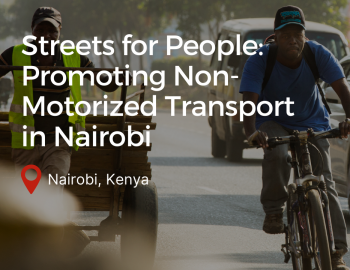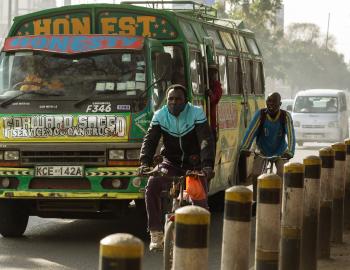Promoting non-motorised transport in Nairobi, Kenya
Promoting non-motorised transport in Nairobi, Kenya
Context
Nairobi is one of Africa’s fastest growing megacities, with a population of over four million inhabitants. If car-oriented planning continues to dominate, it will lock the city into unsustainable carbon-intensive infrastructure and exacerbate the adverse effects of climate change.
In Nairobi, nearly fifty percent of all daily trips are made by walking and cycling. Non-motorised transport (NMT) plays an important role in increasing access to basic services, decongesting cities, improving air quality and promoting healthier lifestyles.
Despite NMT being the most popular means of transport in Nairobi, used by nearly half of the residents, key challenges related to poor infrastructure, safety of users and public awareness on usage of NMT facilities remain. This makes it necessary to invest in an integrated transport system, including NMT infrastructure, that serves the needs of Nairobi residents, while safeguarding the environment.
Project objectives
- Enhance the existing knowledge base on NMT in Nairobi through examining current data gaps along Nairobi’s major NMT corridors.
- Support NMS and other road agencies with ongoing public awareness initiatives on NMT facilities, usage and benefits.
- Publish useful co-produced knowledge products that can be helpful in creating enhanced public awareness and supporting NMS in achieving its NMT objectives.
Project activities
As part of this engagement, CDKN has partnered with Nairobi Metropolitan Services (NMS) on the following:
- Characterising users on Nairobi’s major NMT corridors.
- Undertaking safety audits on Nairobi’s top 10 deadliest corridors.
- Identifying infrastructural and safety challenges faced by NMT users and how to address them.
- Identifying trends that can be used in creating public awareness and supporting road authorities in future NMT development in Nairobi.
- Production of actionable knowledge products.
- Organising forums to bring key stakeholders together, including peer learning opportunities with other major Kenyan cities.
Project outputs
The project’s key outputs are:
-
An NMT Enforcement Dialogue as a follow up to the recommendations from the Study jointly carried out by CDKN and NMS, and the peer learning forums on NMT among officials from Nairobi, Kisumu, Mombasa Cities. This forum report and presentation captures the deliberations from the Enforcement Dialogue.
- A documentary film on key NMT challenges, gains achieved and areas of improvement to enhance the NMT experience in Kenya's major cities.
- A comprehensive study commissioned to examine NMT user, safety and infrastructure trends, with the aim of recommending ways to improve the Nairobi NMT experience. The study has been formally adopted by Nairobi Metropolitan Services as a guide for NMT improvement.
- A forum report on the “Nairobi NMT Governance Forum” organised to present the study findings and buttress commitment from all road agencies to support inter-agency collaboration towards an improved NMT experience.
- As part of the efforts towards implementing the recommendations from the NMT Study, Nairobi Metropolitan Services engaged in bilateral exchanges with Mombasa and Kisumu; Kenya's major cities. This included technical tours of NMT corridors in both cities to celebrate gains, brainstorm on gaps and exchange ideas on improving the NMT user experience, safety and infrastructure.
- This forum report and presentations are from the Mombasa-Kisumu-Nairobi NMT Peer learning exchange.
- This forum report and presentations are from the Kisumu-Nairobi NMT Peer learning exchange.
- A “Nairobi non-motorised transport newsletter series”:
- Issue 1: Air Quality
- Issue 2: Pedestrianisation: Users
- Issue 3: Pedestrianisation: Safety
- Issue 4: Pedestrianisation: Infrastructure
- Issue 5: Cycling
- Issue 6: Public awareness
- Issue 7: Building partnerships
- Issue 8: Sustainable financing
- An infographic on “Multi-Level Governance on NMT in Nairobi” depicting the responsibilities of various agencies across national and sub-national government in relation to NMT while highlighting areas of collaboration.
Partners: Nairobi Metropolitan Services, Executive Office of the President



